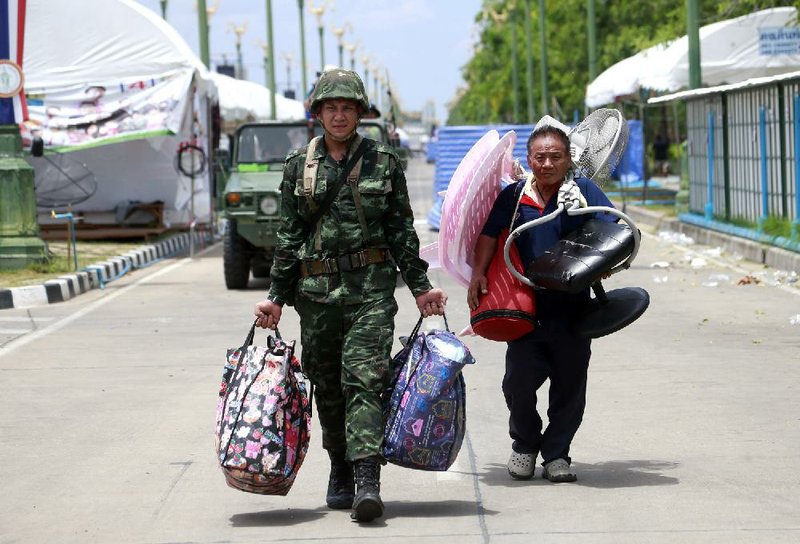BANGKOK — Ousted members of Thailand’s former government surrendered to the new military junta Friday, and soldiers forcefully dispersed hundreds of anti-coup activists who defied a ban on large-scale gatherings to protest the army’s seizure of power.
Troops detained at least two activists during the protest in downtown Bangkok, which descended into scuffles but ended without injury and marked one of the first open challenges to the military since Thursday’s coup.
The junta, though, remained firmly in charge, summoning more than 100 top political figures — the entire ousted government, their associates and a handful of their opponents. It also banned those on its wanted list from leaving the country.
Among the officials at an army compound in Bangkok were former Prime Minister Yingluck Shinawatra, who was sacked earlier this month for nepotism by the Constitutional Court, and her temporary replacement Niwattumrong Boonsongpaisan, according to Yingluck’s aide Wim Rungwattanachinda.
After about 30 minutes, Yingluck left the facility and was taken to another army location by soldiers, said Wim, who added that it appeared she would not be immediately released.
It was unclear what the military’s intentions were beyond the summons, which it said had been issued “to keep peace and order and solve the country’s problems.”
By nightfall, dozens of the people who had surrendered were still being held, though at least eight former Cabinet ministers had been released.
Education Minister Chaturon Chaisang, an outspoken critic of the military’s intervention in politics, remained in hiding. Chaturon said in a Facebook post that the coup would only worsen the country’s political atmosphere. He vowed not to turn himself in but said he would not resist arrest.
Most of the country was calm, and there was little military presence on Bangkok’s streets. But a curfew from 10 p.m. to 5 a.m. was still in effect.
Restrictions on TV broadcasts and on posting inflammatory comments on social media remained in effect, and many Thais were reluctant to comment publicly on the coup.
There were no reports of any major unrest, including in the former government’s political strongholds in the north. In the northeast city of Chiang Mai, about 100 anti-coup demonstrators took to the streets, but no violence was reported and the protesters dispersed on their own.
The army staged the coup Thursday just after a military-hosted meeting of political rivals to resolve the country’s political deadlock.
After two hours and no resolution, armed soldiers detained the participants, including four Cabinet ministers, and army chief Gen. Prayuth Chan-Ocha appeared on national television to announce the takeover. Hours later, the junta suspended the constitution and banned gatherings of more than five people.
Prayuth defended the coup as necessary to restore stability amid increasing spasms of violence that, along with contentious court rulings, had rendered the government powerless.
He briefed foreign diplomats Friday about the coup and said how long the ruling military council remains in power depends on how soon the current political conflict can be eased, Foreign Ministry Permanent Secretary Sihasak Phuangketkeow said.
Thursday’s events were the latest response to a societal schism laid bare after a 2006 coup deposed former Prime Minister Thaksin Shinawatra, the older brother of Yingluck and a billionaire tycoon whose populist movement has won every national election since 2001. Thaksin lives in self-imposed exile to avoid corruption charges, but he still wields influence over Thailand’s political affairs.
The latest crisis has left 28 people dead and more than 800 wounded since November.
U.S. Secretary of State John Kerry condemned the takeover and warned it would have a negative effect on U.S.-Thai relations. The State Department said it has suspended $3.5 million in military aid and is reviewing another $7 million in bilateral assistance and other aid.
Late Thursday, Gen. Ray Odierno, the U.S. Army chief of staff, urged Prayuth to return the country to democratic rule.
Pentagon spokesman Rear Adm. John Kirby said Odierno called Prayuth and was clear about the expectation that democratic principles be restored as soon as possible. Kirby said it was a constructive conversation but declined to provide more details.
Kirby said that as of Friday, U.S. military exercises with Thailand have not been called off. There are 700 U.S. troops participating in the exercises, which include ships and aircraft.
Information for this article was contributed by Todd Pitman, Jocelyn Gecker, Raul Gallego, Chalida Ekvitthayavechnukul, Matthew Pennington and Lolita C. Baldor of The Associated Press.


